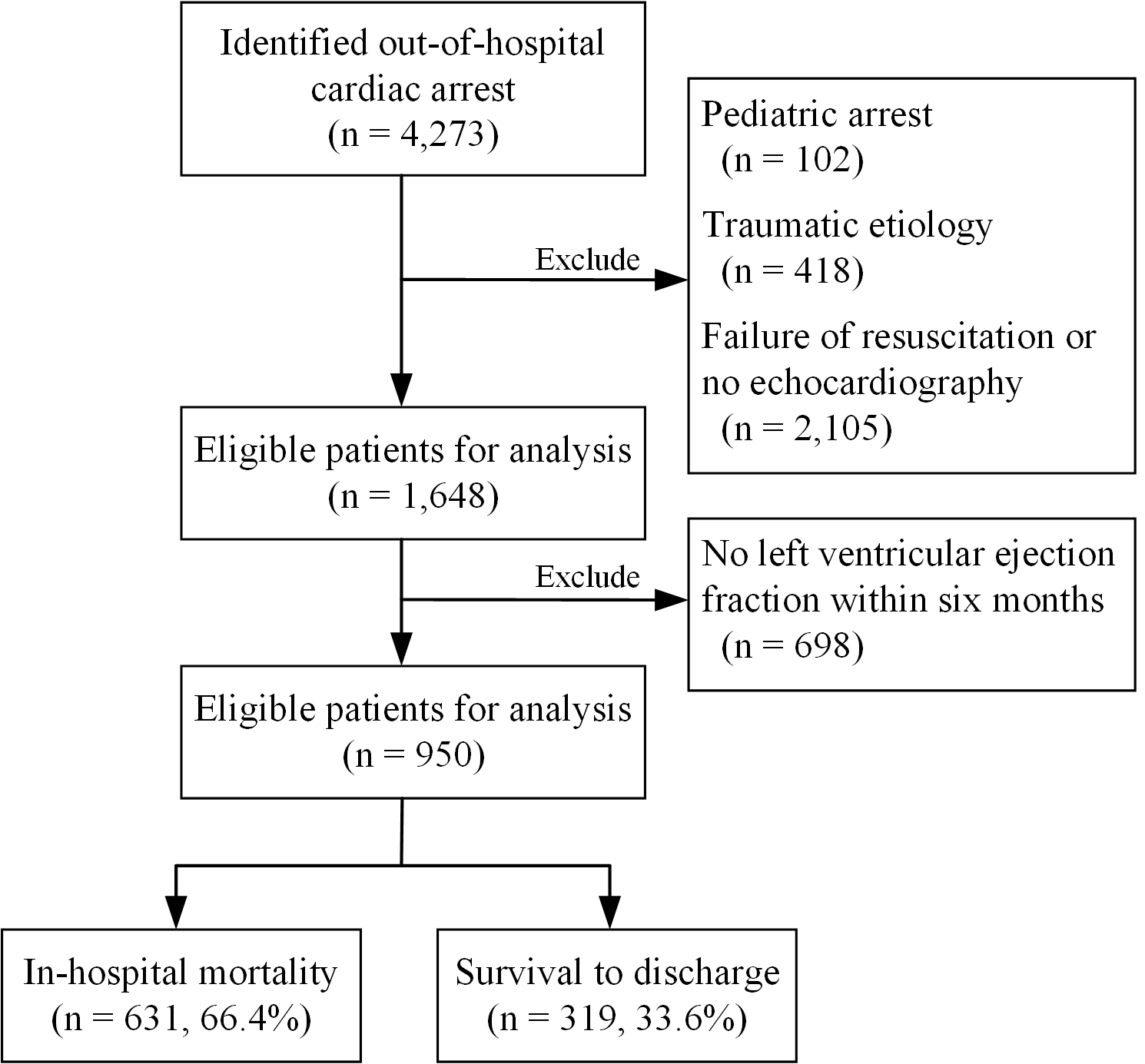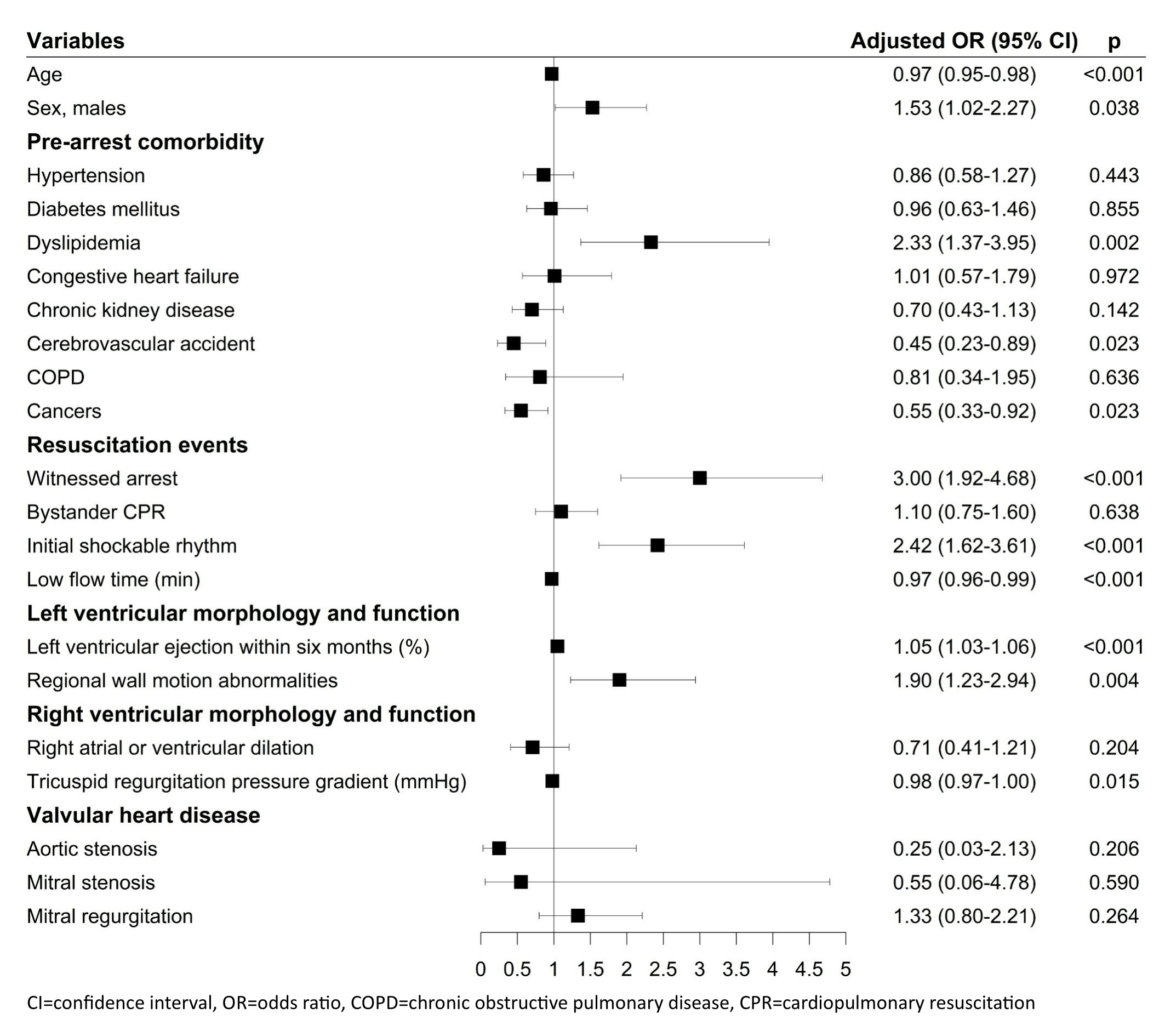Final ID: Su905
Pre-Arrest Left Ventricular Ejection Fraction is Associated with Survival Outcome in Nontraumatic Out-of-Hospital Cardiac Arrest
Abstract Body: Background
Out-of-hospital cardiac arrest (OHCA) poses a major public health challenge because of its poor outcome. Although pre-arrest heart function has been recognized as a prognostic factor, the specific contribution of pre-arrest echocardiographic assessment in predicting OHCA outcome remains sparse.
Hypothesis
Patients with normal range left ventricular ejection fraction (LVEF) exhibit higher survival rates after OHCA.
Aims
We meticulously documented the data from echocardiograms, including LVEF, tricuspid regurgitation pressure gradient (TRPG), cardiac morphology, and valvular function. Our objective is to investigate the association between LVEF performed six months prior to OHCA and the patient's survival.
Methods
This multicenter retrospective cohort study reviewed records from National Taiwan University Hospital and its affiliated hospitals from 2016 to 2022. Adult, nontraumatic OHCA patients were included. Data included demographics, pre-existing diseases, resuscitation events, and echocardiographic report. Statistical analysis involved multivariable logistic regression to adjust for potential confounders, reported as adjusted odds ratio (aOR) and 95% confidence interval (CI), and to assess the association between echocardiographic findings and survival to discharge.
Results
This study analyzed 950 patients, with 33.6% surviving to discharge. The median age of participants was 68 years, with a predominance of men (65.1%). Survival was associated with higher pre-arrest LVEF (aOR = 1.05, 95% CI = 1.03-1.06, p < 0.001) and lower TRPG (aOR = 0.98, 95% CI = 0.97-1.00, p = 0.015). However, either LVEF or TRPG alone showed limited predictive value in OHCA survival. Other significant predictors of survival included younger age, male sex, pre-existing dyslipidemia, stroke, cancer, witnessed arrest, initial shockable rhythm, and shorter low flow time.
Conclusions
Increased pre-arrest LVEF and decreased pre-arrest TRPG six months prior to OHCA may be associated with survival to hospital discharge, independent of pre-existing congestive heart failure. While most valvular heart diseases observed were mild and not significantly associated with survival outcomes, post-cardiac arrest intensivists should pay particular attention to patients with aortic stenosis due to its inherent low survival rate. This observation underscores the importance of careful cardiac function monitoring and tailored management strategies in patients at risk of cardiac arrest.
Out-of-hospital cardiac arrest (OHCA) poses a major public health challenge because of its poor outcome. Although pre-arrest heart function has been recognized as a prognostic factor, the specific contribution of pre-arrest echocardiographic assessment in predicting OHCA outcome remains sparse.
Hypothesis
Patients with normal range left ventricular ejection fraction (LVEF) exhibit higher survival rates after OHCA.
Aims
We meticulously documented the data from echocardiograms, including LVEF, tricuspid regurgitation pressure gradient (TRPG), cardiac morphology, and valvular function. Our objective is to investigate the association between LVEF performed six months prior to OHCA and the patient's survival.
Methods
This multicenter retrospective cohort study reviewed records from National Taiwan University Hospital and its affiliated hospitals from 2016 to 2022. Adult, nontraumatic OHCA patients were included. Data included demographics, pre-existing diseases, resuscitation events, and echocardiographic report. Statistical analysis involved multivariable logistic regression to adjust for potential confounders, reported as adjusted odds ratio (aOR) and 95% confidence interval (CI), and to assess the association between echocardiographic findings and survival to discharge.
Results
This study analyzed 950 patients, with 33.6% surviving to discharge. The median age of participants was 68 years, with a predominance of men (65.1%). Survival was associated with higher pre-arrest LVEF (aOR = 1.05, 95% CI = 1.03-1.06, p < 0.001) and lower TRPG (aOR = 0.98, 95% CI = 0.97-1.00, p = 0.015). However, either LVEF or TRPG alone showed limited predictive value in OHCA survival. Other significant predictors of survival included younger age, male sex, pre-existing dyslipidemia, stroke, cancer, witnessed arrest, initial shockable rhythm, and shorter low flow time.
Conclusions
Increased pre-arrest LVEF and decreased pre-arrest TRPG six months prior to OHCA may be associated with survival to hospital discharge, independent of pre-existing congestive heart failure. While most valvular heart diseases observed were mild and not significantly associated with survival outcomes, post-cardiac arrest intensivists should pay particular attention to patients with aortic stenosis due to its inherent low survival rate. This observation underscores the importance of careful cardiac function monitoring and tailored management strategies in patients at risk of cardiac arrest.
More abstracts on this topic:
A Recalled Experience of Death Among Cardiac Arrest Survivors Is Associated with Improved Psychological Outcomes
Goins Imani, Ingram Cambell, Wei Lijing, Gonzales Anelly, He Tun, Moore Sacha, Parnia Sam
A Comparison of Synchronized Versus Unsynchronized Mechanical Chest Compressions in a Swine ModelMarill Keith, Menegazzi James, Gumucio Jorge, Salcido David


